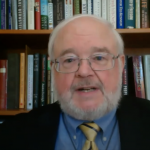Tuesday Topics: Your Conscience, Your Vote
“I have come that they may have life and have it more abundantly,” John 10,10
Concluding Statement Regarding Election 2020 and Catholic Voting
Since mid-August, the Association of U.S. Catholic Priests’ website has sought to bring information, Catholic thinking, and especially Catholic Social Teaching to bear on people’s conscientious preparation to exercise their sacred privilege and responsibility of voting. Our postings have been under the banner of YOUR CONSCIENCE, YOUR VOTE. In this effort we have extended the reach of the U.S. Conference of Catholic Bishops’ quadrennial document titled Forming Conscience for Faithful Citizenship.
We have sought to encourage and help people prepare to vote without telling people how they must vote. We hold to that principle even as other sources in our Catholic community have misled conscientious Catholics by imposing their must vote on Catholics, some going even so far as to assert sin if not followed.
Through these many months of campaigning all Americans have struggled with the many issues in play under the competing aegis of political parties and candidates. We endorse neither party nor presidential candidate. We endorse the right of every person to respond to their conscience, no one else’s, in reaching their decision.
As our effort concludes we wish to accent the important element of character in voters’ reaching their choice of presidential candidates and those for other offices up and down the ballot each receives. By character we mean the commitment and practice of such values as Truth, Honesty, Morality, Integrity, Trustworthiness, Respect for other persons and for the Law, Civility and Public Decorum, Compassion and Empathy, Prudence, Justice, Temperance, Fortitude, and Sense of Service to all the people in the electorate in a nation, even in the world. The USCCB’s Forming Consciences for Faithful Citizenship affirms that election “decisions should take into account a candidate’s commitments, character, integrity, and ability to influence a given issue. (para #37) Pope Francis observes that popular leaders can unite people for the common good or exploit them for personal advantage and power by appealing “to the basest and most selfish inclinations of certain sectors of the population.” (Fratelli Tutti, #159)
Pope St. John Paul II told the people of Poland “Do not be afraid to insist on your rights. Refuse a life based on lies and double thinking. Do not be afraid to suffer with Christ.” Blessed Fr. Jerzy Popieluszko heard that voice and wrote that “The priest is called to bear witness to the truth, to suffer for the truth, and if need be to give up his life for it.” He did lose his life for bearing witness to the truth as did Martyr Archbishop St. Oscar Romero of El Salvador and others.
With such examples, we feel responsible to witness our truth as best we can. For each and all of us, it is our conscience, our vote. This piece of wisdom from the Old Testament Book of Sirach concludes our contribution to Election 2020:
A wise magistrate gives stability to his people,
And government by the intelligent is well ordered.
As the people’s judge, so the officials;
As the head of a city, so the inhabitants.
A reckless king destroys his people,
But a city grows through the intelligence of its princes.
Sovereignty over everyone is in the hand of God.
Ch.10:1-3; 5

General Catholic Voting Resources
In forming your conscience as Catholic voters, consider also the ways in which our political world is interconnected with the climate crisis and our duty to care for our Common Home.
AUSCP Resources for Catholic Voting – Updated Weekly
Tuesday, November 3rd
Tuesday, October 27th
Tuesday, October 20th
Tuesday, October 13th
See previous columns by Jim Bacik for more Christian perspectives on voting in 2020.
Tuesday, October 6th
See previous columns by Jim Bacik for more Christian perspectives on voting in 2020.
Tuesday, September 29th
Tuesday, September 22nd
Your Conscience, Your Vote: Interactive Infographic
